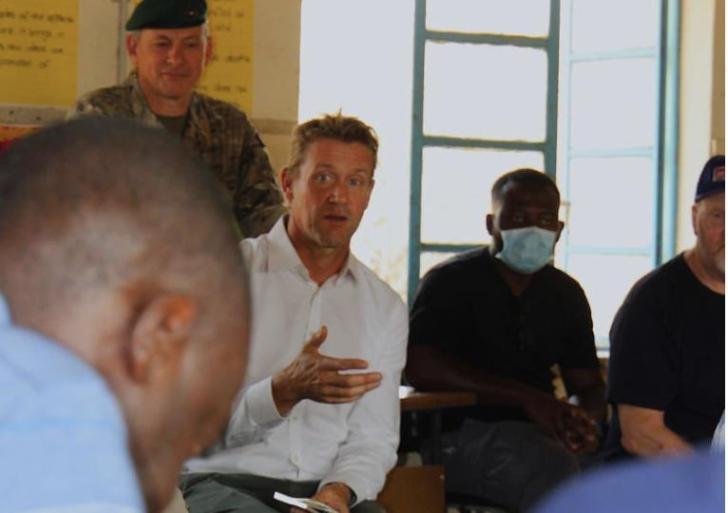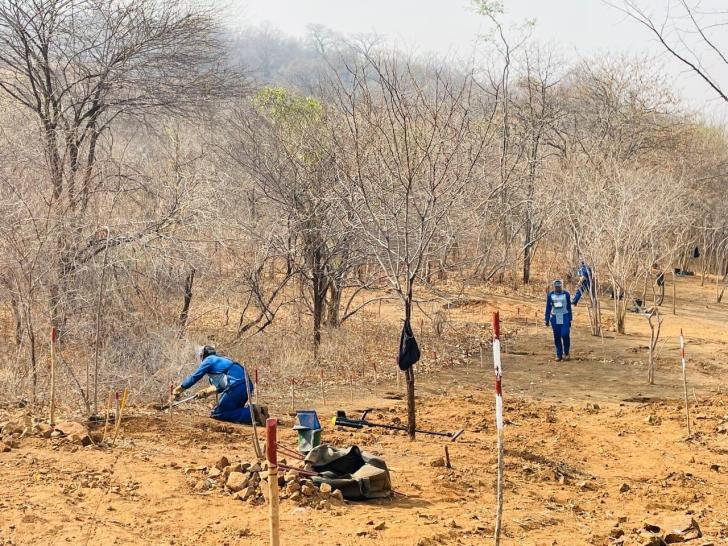News / National
Zim demining fund to create opportunities for women: UK Ambassador
21 Sep 2024 at 09:47hrs |
0 Views

UK Ambassador to Zimbabwe, Pete Vowles during a meeting with some stakeholders in Rushinga
The United Kingdom has announced an additional USD5.5 million fund to support landmine clearance in Zimbabwe's Mashonaland East and Central provinces while also seeking to raise risky-related educational awareness within communities and create employment opportunities for women.
The British Ambassador to Zimbabwe, Pete Vowles, has claimed that this funding has been allocated to the Mines Advisory Group (MAG) and The HALO Trust (HALO).
"It will save lives and significantly contribute to Zimbabwe's goal of achieving landmine-free status by 2025. The release of land for agriculture, housing, and basic social services will support livelihoods and promote economic development in the affected communities," Pete Vowles said.
"The funding also opens up employment and career opportunities in demining teams, particularly for women," Vowles said.
"I want to salute the bravery and dedication of the deminers working to create safe and secure environments in Mashonaland East and Central," Ambassador Vowles said during his visit to Rushinga, Mashonaland Central Province.
 Men and women working to clear landmines in Rushinga, Mashonaland Central, Zimbabwe.
Men and women working to clear landmines in Rushinga, Mashonaland Central, Zimbabwe.
Vowles said that the UK remains committed in its determination to work towards a mine-free world and is delighted to award the extra funding to MAG and The HALO Trust so they can continue to protect lives and open up opportunities for economic development for affected communities.
"The UK is proud to be working in partnership with the Zimbabwe Mine Action Committee (ZIMAC) to help deliver the government of Zimbabwe’s demining strategy," Vowles said.
Meanwhile, Oliver Gerard-Pearse who is the HALO Zimbabwe Programme Manager claimed that with continued support from the UK Government, HALO will be able to ensure that "fewer children in Rushinga and Mudzi are forced to choose between walking through a minefield or receiving an education," Gerard-Pearse said.
"Also, fewer parents will have to choose between feeding their families or working their farmland close to dangerous explosives. We are very grateful for the life-saving collaboration between the UK Government, The HALO Trust, Mines Advisory Group and the Government and people of Zimbabwe that this funding represents," Gerard-Pearse added.
The funding follows UK Government's Global Mine Action Programme (GMAP) announcement in February 2024 of USD22.2 million for mine clearance efforts in eight countries including Zimbabwe.
Under the new allocation, MAG will deliver clearance and risk education in Mashonaland East, while HALO will provide similar services in both Mashonaland Central and Mashonaland East.
Landmines were laid in Zimbabwe in the 1970s by the former white minority government and up until today, approximately 18.3 km² of contaminated land remains, classified as "medium" by the Mine Action Review.
Zimbabwe is one of the few countries actively working to meet the 2025 clearance deadline under the Ottawa Convention.
The UK has long supported Zimbabwe's demining efforts through the GMAP programme, with funding beginning in 2016.
Under this current phase, GMAP will provide a total of USD5.5million, including USD1.4million for the current financial year and USD4.1million for the next period.
This funding makes Zimbabwe the second-largest UK demining programme for the years 2024/25, behind Ukraine.
The British Ambassador to Zimbabwe, Pete Vowles, has claimed that this funding has been allocated to the Mines Advisory Group (MAG) and The HALO Trust (HALO).
"It will save lives and significantly contribute to Zimbabwe's goal of achieving landmine-free status by 2025. The release of land for agriculture, housing, and basic social services will support livelihoods and promote economic development in the affected communities," Pete Vowles said.
"The funding also opens up employment and career opportunities in demining teams, particularly for women," Vowles said.
"I want to salute the bravery and dedication of the deminers working to create safe and secure environments in Mashonaland East and Central," Ambassador Vowles said during his visit to Rushinga, Mashonaland Central Province.
 Men and women working to clear landmines in Rushinga, Mashonaland Central, Zimbabwe.
Men and women working to clear landmines in Rushinga, Mashonaland Central, Zimbabwe.Vowles said that the UK remains committed in its determination to work towards a mine-free world and is delighted to award the extra funding to MAG and The HALO Trust so they can continue to protect lives and open up opportunities for economic development for affected communities.
"The UK is proud to be working in partnership with the Zimbabwe Mine Action Committee (ZIMAC) to help deliver the government of Zimbabwe’s demining strategy," Vowles said.
"Also, fewer parents will have to choose between feeding their families or working their farmland close to dangerous explosives. We are very grateful for the life-saving collaboration between the UK Government, The HALO Trust, Mines Advisory Group and the Government and people of Zimbabwe that this funding represents," Gerard-Pearse added.
The funding follows UK Government's Global Mine Action Programme (GMAP) announcement in February 2024 of USD22.2 million for mine clearance efforts in eight countries including Zimbabwe.
Under the new allocation, MAG will deliver clearance and risk education in Mashonaland East, while HALO will provide similar services in both Mashonaland Central and Mashonaland East.
Landmines were laid in Zimbabwe in the 1970s by the former white minority government and up until today, approximately 18.3 km² of contaminated land remains, classified as "medium" by the Mine Action Review.
Zimbabwe is one of the few countries actively working to meet the 2025 clearance deadline under the Ottawa Convention.
The UK has long supported Zimbabwe's demining efforts through the GMAP programme, with funding beginning in 2016.
Under this current phase, GMAP will provide a total of USD5.5million, including USD1.4million for the current financial year and USD4.1million for the next period.
This funding makes Zimbabwe the second-largest UK demining programme for the years 2024/25, behind Ukraine.
Source - Byo24News
Join the discussion
Loading comments…





























